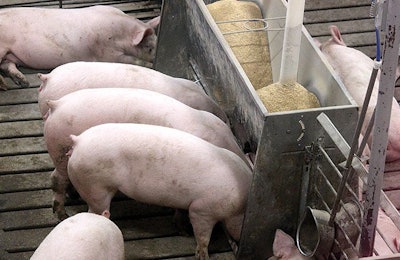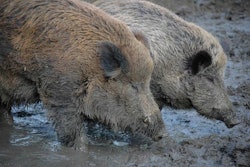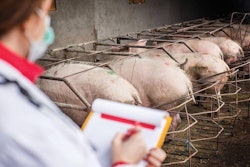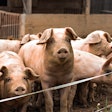
Over the past two weeks, the only European countries reporting new cases of African swine fever were Bulgaria and Romania. More cases have been confirmed among Poland’s wild boar population, raising the disease threat level in Germany.
Progress of African swine fever (ASF) in Bulgaria has taken a worrying direction after confirmation of the disease in seven herds of domestic pigs since December 30.
According to official reports, presence of the virus was confirmed after a total of 86 pigs died. More than 63,900 pigs have been destroyed. Five of the affected locations were farms, and the other two outbreaks were small backyard herds.
First to be impacted by the disease were two small farms with 153 and 22 pigs at Byal in the province of Shumen, according to the agriculture ministry’s official report to the World Organisation for Animal Health (OIE). Within a few days, the disease had hit a large commercial unit with 24,000 pigs at Nikola Kozlevo in the same province.
A follow-up report to the OIE outlines a further four outbreaks, all confirmed on January 8. These included a large commercial unit with almost 40,000 pigs at Vulchi in Shumen, and smaller one with 29 pigs at Gergini in the province of Gabrovo. Also affected were backyard units at Veselnovo in Shumen, and Borov in the province of Sliven.
These developments have prompted a nationwide ban on the transport of pigs. Movement restrictions will remain in place until officials complete checks on pig holdings, transport vehicles and slaughterhouses, according to Sofia Globe.
The same source reports information from the national food safety agency, which puts the number of ASF outbreaks since the start of 2020 at 5. Two of these were at commercial farms — one in each of the neighboring provinces of Shumen and Varna.
Bulgaria investigates possible biosecurity breaches
Samples have been taken from dead pigs at all the locations for analysis by the national laboratory. Only animals from ASF-free facilities will be allowed for slaughter for human consumption. In the meantime, the facilities are being cleaned and disinfected.
Biosecurity failures have been blamed for the entry of ASF to two of the commercial farms, which are linked, reports Sofia Globe. Investigations are currently underway to determine which of the facilities — the one in Nikola Kozlevo, or that in the Varna district of Brestak — is responsible for these breaches.
None of the affected provinces has an international border. Since the middle of 2019, ASF has been circulating in several Bulgarian provinces among the wild boar population.
Backyard pigs affected in Romania
Romania’s veterinary agency has reported six new ASF outbreaks in domestic pigs to the OIE over the past two weeks. Affecting a total of 64 animals in five counties, all outbreaks were in small backyard herds.
Further cases among European wild boar
Five central and eastern European states have reported new cases of ASF among wild boar to the OIE over the past two weeks.
With 198 animals reported as infected, Poland has once again registered the highest number of cases. Of the total, 116 animals were found in the previously affected eastern provinces of Lublin, Mazovia, Podkarpackie, Podlaskie and Warmia-Masuria in the period December 4-23. Between November 11 and December 4, 82 wild boar were found to be positive for the ASF virus in the western province of Lubusz and neighboring Greater Poland (Wielkopolska).
Also reporting new outbreaks in wild boar to the OIE were Hungary (98 animals), Romania (49), Latvia (21) and Russia (2).
In addition, Estonia has confirmed ASF in one wild boar to the European Commission since the start of 2020.
Germany urges vigilance
The rapid increase in the number of ASF reported in western Poland near to the international border has raised concerns in Germany.
Germany’s agriculture ministry (BMEL) has called for greater alertness as well as strict adherence to disease prevention measures. Some of the latest cases in wild boar in Poland were within 20-30 kilometers of the border.
In mid-December, a meeting between the German and Polish authorities concluded that any hunting of wild boar within 8-15 kilometers of the international border should be undertaken only with minimal disturbance to the animals.
ASF situation in other regions
There have been no new reports of ASF outbreaks in Africa. In Asia, new cases have occurred in domestic pigs in Indonesia, and in South Korean wild boar.
View our continuing coverage of the African swine fever outbreaks.


















